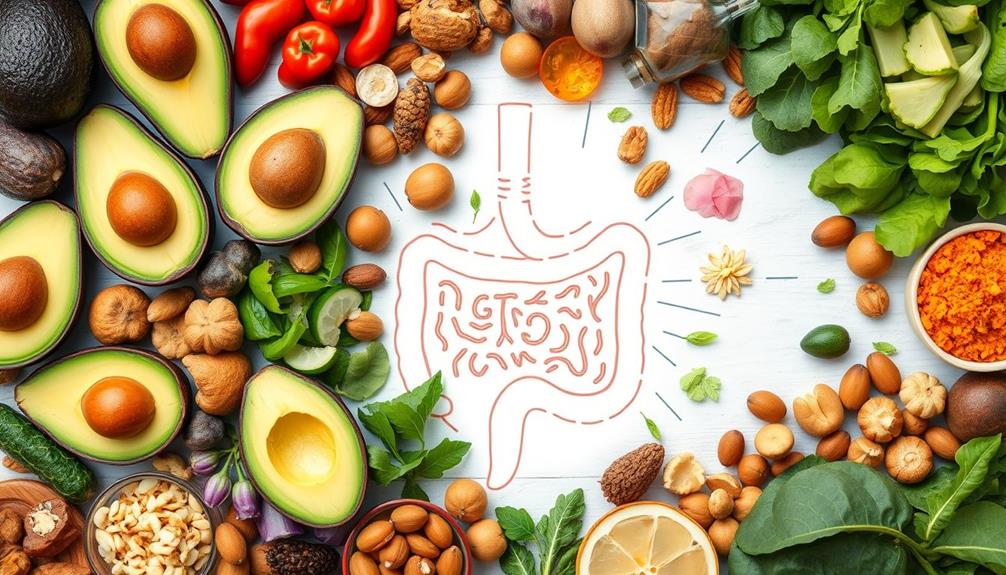The keto diet greatly impacts your gut health. By prioritizing high fats and low carbs, it can improve microbiome diversity while lowering inflammation. However, you might face risks like nutrient deficiencies and constipation due to reduced fiber intake. Adjusting can bring on "keto flu" symptoms, including bloating and digestive changes. To support gut health, incorporate low-carb vegetables and fermented foods, and don't forget to stay hydrated. Monitoring your body's reactions is key to steering through potential challenges. If you're curious about how to balance these effects, there's a lot more to explore on this topic.
Key Takeaways
- The keto diet may improve gut microbiome diversity but can also disrupt its balance due to low carbohydrate intake.
- A significant reduction in fiber can lead to constipation and altered bowel habits during the transition to ketosis.
- Incorporating low-carb, high-fiber vegetables and fermented foods can enhance digestion and promote beneficial bacteria growth.
- Staying hydrated is crucial to alleviate digestive issues and support overall gut health while on a keto diet.
- Monitoring nutrient intake is essential to prevent deficiencies and maintain gut health throughout the keto lifestyle.
What Is the Keto Diet?

Have you ever wondered how a diet high in fat and low in carbs can transform your body? The keto diet focuses on drastically reducing carbohydrate intake while increasing fat consumption, leading your body into a metabolic state called ketosis.
In ketosis, your body burns fat for energy instead of relying on glucose from carbs. This shift not only promotes rapid weight loss but also enhances mental clarity and stabilizes blood sugar levels. Additionally, incorporating mindfulness practices can help reduce emotional eating during this dietary change.
Typically, you'll aim for a macronutrient ratio of about 70% fat, 25% protein, and just 5% carbs. It's crucial to monitor your macronutrient and calorie intake using tools like keto calculators to stay on track.
Gut Health and the Keto Diet
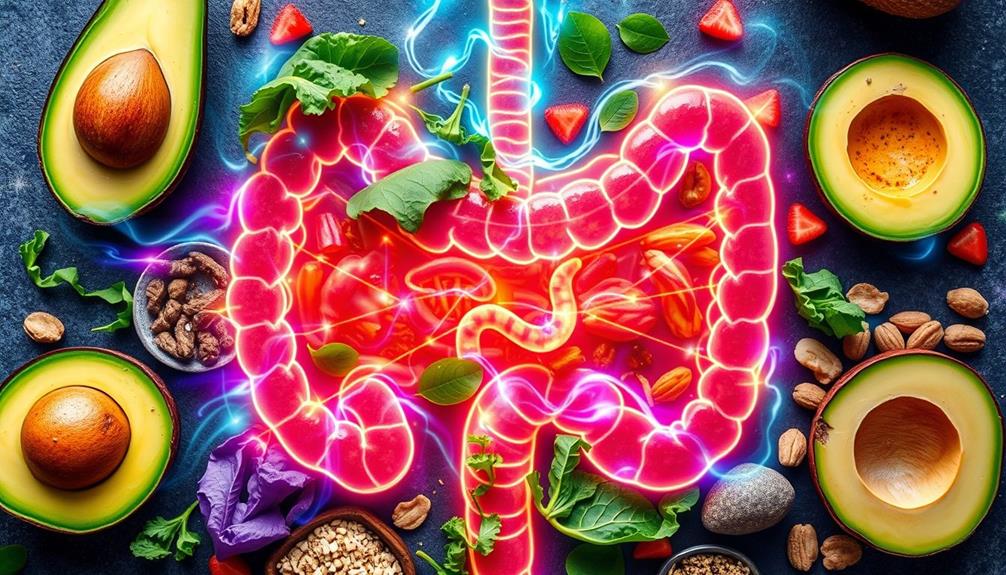
Understanding the keto diet's impact on gut health is essential for anyone looking to adopt this high-fat, low-carb lifestyle. While you may experience benefits like improved gut microbiome diversity and reduced inflammation, there are also risks to take into account, including disrupted gut microbiome balance and increased constipation. It’s important to note that the keto diet can lead to a decrease in fiber intake, which can contribute to constipation and imbalanced gut bacteria. Additionally, the high intake of saturated fats in the keto diet may also contribute to inflammation in some individuals. Therefore, it’s crucial to carefully monitor and adjust your keto diet to ensure that it supports a healthy gut and overall well-being. Understanding the relationship between the keto diet and inflammation is vital for making informed decisions about your dietary choices.
| Benefits of Keto on Gut Health | Risks of Keto on Gut Health |
|---|---|
| Improved gut microbiome diversity | Disrupted gut microbiome balance |
| Reduced inflammation | Increased constipation risk |
| Better nutrient absorption | Potential nutrient deficiencies |
| Enhanced fat-soluble vitamin absorption | Decreased microbial diversity |
| Supports anti-inflammatory properties | Shifts in gut flora composition |
Being mindful of these factors will help you maintain gut health as you navigate the keto diet.
Digestive Issues During Transition

Shifting to a keto diet can lead to several digestive issues, often referred to as "keto flu." As your body adapts to burning fat for fuel instead of carbohydrates, you might experience symptoms like constipation, bloating, and altered bowel habits.
These digestive issues often stem from a significant reduction in fiber intake, which can disrupt your gut bacteria balance. It's important to reflect on the role of hydration and water intake, as staying well-hydrated can help ease these symptoms and support gut health.
To alleviate these symptoms, try increasing your intake of low-carb vegetables and staying well-hydrated. Additionally, incorporating natural remedies alongside conventional medications may also be beneficial during this shift.
Gradually adjusting to higher fat consumption can also help your digestive system adapt more smoothly. Remember, listening to your body is essential during this shift, as individual responses may vary. Monitor how you feel and make adjustments as needed for a healthier keto experience.
Foods to Promote Gut Health

To promote gut health on a keto diet, focus on incorporating a variety of nutrient-dense foods that support beneficial gut bacteria. Essential oils like eucalyptus oil can also play a supportive role in maintaining overall health, which indirectly benefits gut function.
Start by including high-fiber vegetables like spinach, kale, and broccoli, which aid digestion while keeping carbs low. Fermented foods such as sauerkraut and kimchi are excellent choices, as they enhance the growth of good bacteria.
Don't forget healthy fats like olive oil and MCT oil, which contribute to a balanced microbiome. Avoid processed foods, artificial sweeteners, and high-fat dairy products that can disrupt gut health.
Instead, prioritize nuts and seeds to prevent nutrient deficiencies. By making these mindful food choices, you can support your gut health while enjoying the benefits of a keto lifestyle.
Benefits of Keto for Gut Health
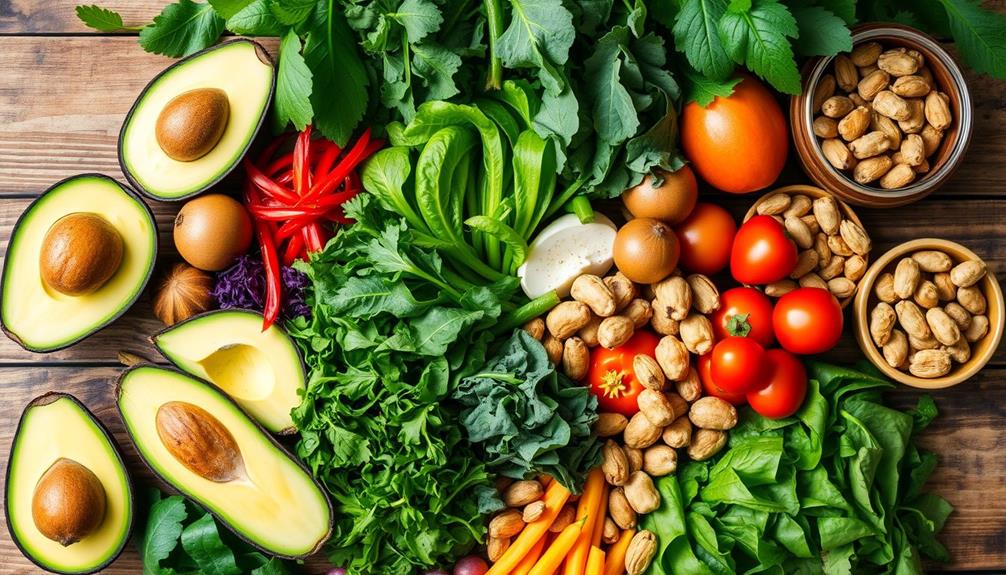
Incorporating the right foods into your keto diet not only supports gut health but also brings several unique benefits.
You'll likely notice improved gut microbiome diversity, which is essential for digestion and overall wellness. By reducing carbohydrates, the keto diet can lower inflammation levels, promoting a healthier gut lining and enhancing nutrient absorption.
Healthy fats, like olive oil and avocados, play an important role in maximizing the absorption of fat-soluble vitamins. Additionally, including high-fiber, low-carb veggies helps maintain bowel regularity and balance gut bacteria.
Risks Associated With Keto Diet
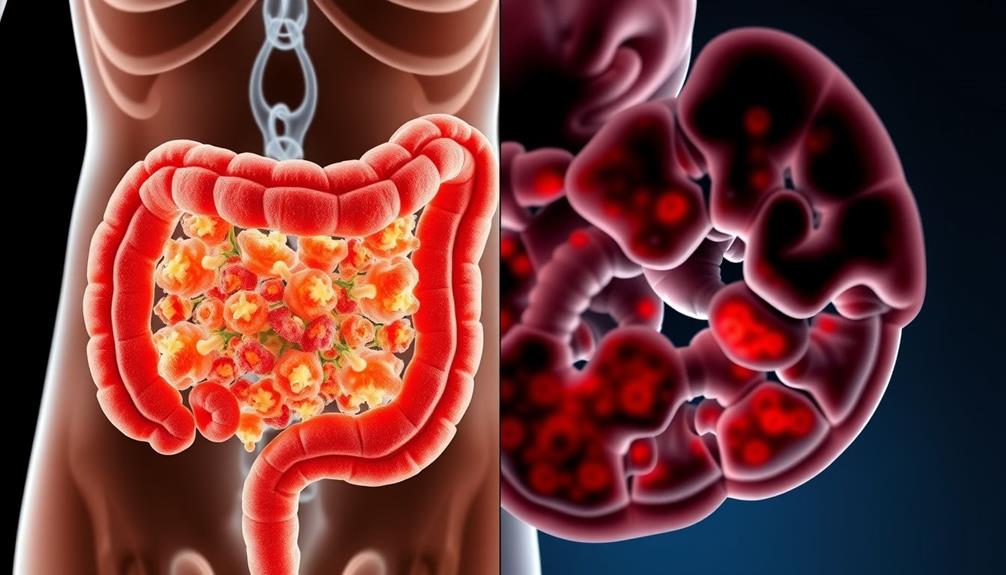
Steering through the risks associated with the keto diet requires careful consideration, as it can lead to various challenges for your gut health.
One major concern is the potential disruption of your gut microbiome balance due to the significant reduction in carbohydrates. This shift may decrease microbial diversity, which is essential for ideal gut function.
Additionally, you might experience increased constipation, as low fiber intake can hinder regular bowel movements.
Nutrient deficiencies can also arise from rapid weight loss, impacting your overall health.
While the keto diet can offer benefits, you need to be mindful of these risks and monitor your body's responses closely. Staying informed will help you navigate these challenges effectively.
Tips for Maintaining Gut Health
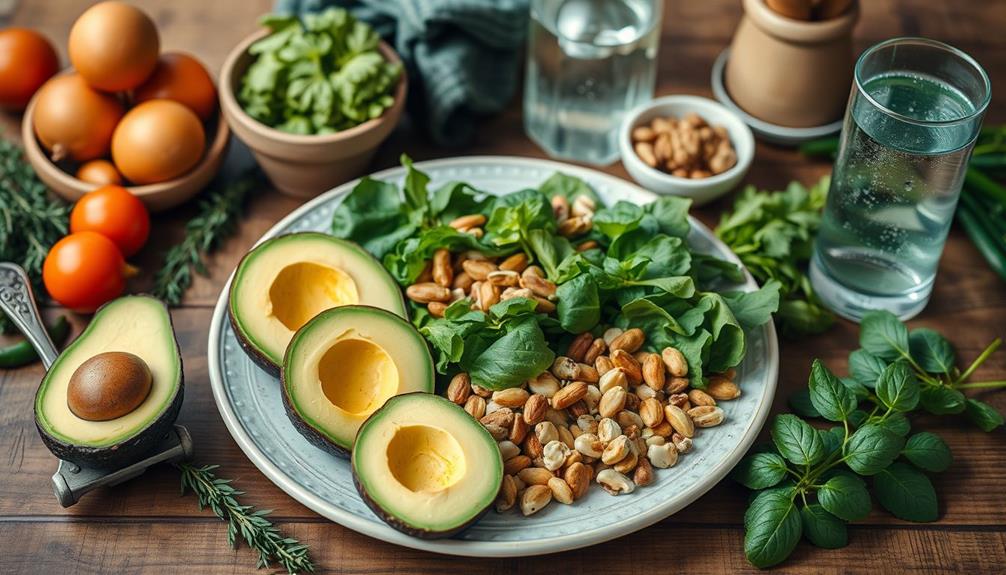
Maintaining gut health while on a keto diet is essential for overall well-being. Here are some tips to help you keep your gut thriving:
- Increase Low-Carb Vegetables: Incorporate high-fiber veggies like spinach, kale, and broccoli to support digestion and gut bacteria.
- Stay Hydrated: Drink plenty of water to prevent constipation, especially since lower carb intake can reduce hydration levels.
- Consider Probiotics: Add fermented foods like kimchi or sauerkraut to your meals to promote beneficial gut bacteria.
Frequently Asked Questions
Can the Keto Diet Help Manage IBS Symptoms Effectively?
The keto diet might help manage IBS symptoms for some people, as it promotes a reduction in carbohydrate intake that can lead to less bloating and gas.
By focusing on healthy fats and low-carb vegetables, you may find relief from certain triggers.
However, everyone's body reacts differently, so it's important to monitor how your symptoms change.
Consulting with a healthcare professional can help tailor the diet to your specific needs and guarantee nutritional balance.
How Does the Keto Diet Affect Pre-Existing Gut Conditions?
The keto diet can greatly affect pre-existing gut conditions. You might experience both positive and negative changes, such as improved inflammation and better nutrient absorption. However, some individuals with gut conditions like irritable bowel syndrome (IBS) may experience worsening symptoms on the keto diet due to its high fat and low fiber content. It’s important to consult with a healthcare professional before starting the keto diet, especially if you have a pre-existing gut condition. Additionally, research has also shown a potential link between the keto diet and bone health, as the diet may lead to decreased calcium intake and a higher risk of bone fractures.
However, it can also disrupt your gut microbiome, leading to constipation or discomfort. If you're considering keto, monitor how your body responds and adjust your fiber intake accordingly.
Staying hydrated and incorporating low-carb vegetables can help mitigate potential digestive issues while supporting gut health.
Are There Specific Probiotics Recommended for Keto Dieters?
Imagine your gut feeling as vibrant as a summer's day.
If you're on the keto diet, you might wonder about probiotics. While there aren't specific brands tailored just for keto, look for ones with diverse bacterial strains, especially Lactobacillus and Bifidobacterium. They can help support your gut health.
Incorporating fermented foods like kimchi or sauerkraut can also boost beneficial bacteria while keeping your carb intake in check.
Stay mindful of your body's responses!
Can Intermittent Fasting Complement the Keto Diet for Gut Health?
Intermittent fasting can definitely complement the keto diet for gut health. By timing your meals, you give your digestive system a break, which may enhance gut function.
This approach can help reduce inflammation and promote a balanced microbiome. Plus, fasting can encourage fat-burning, aligning perfectly with your keto goals.
Just make sure to stay hydrated and choose nutrient-dense foods during eating windows to support overall gut wellness while following these dietary strategies.
What Is the Long-Term Impact of Keto on Gut Flora Diversity?
The long-term impact of the keto diet on gut flora diversity can be significant.
As you reduce carbohydrate intake, your gut microbiome may shift, potentially decreasing diversity. While some beneficial bacteria thrive on fat, others that rely on carbs might diminish.
It's essential to incorporate high-fiber, low-carb vegetables and fermented foods to support diversity.
Regularly monitoring your gut health will help you adapt and maintain a balanced microbiome throughout your keto journey.
Conclusion
In exploring the keto diet's impact on gut health, it's clear that while you can enjoy benefits like enhanced nutrient absorption, you also need to be mindful of potential risks. By choosing gut-friendly foods and staying aware of digestive issues during your shift, you can strike a balance. So, embrace the journey with informed choices, and you'll not only support your gut but also reveal the full potential of the keto lifestyle. Your digestive wellness matters!
